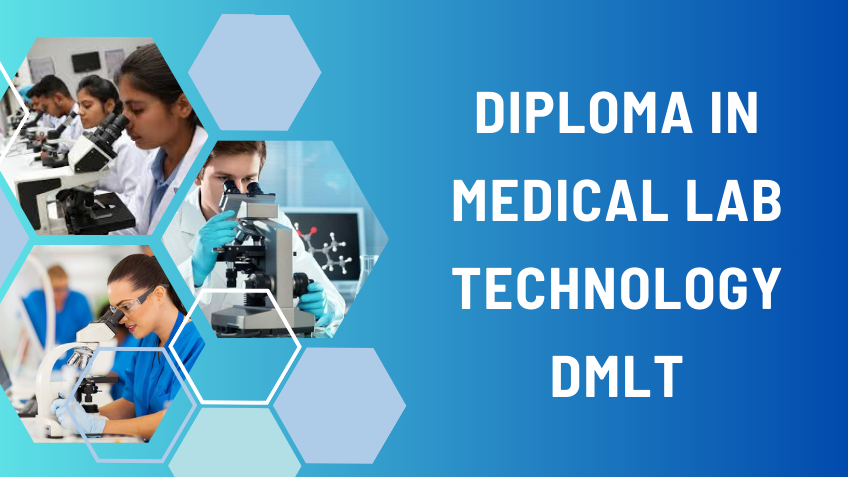
Arrange a Callback
Diploma in Medical lab Technology dmlt
Introduction
The diploma in medical lab technology dmlt program is designed for those seeking a healthcare career. This course provides you with the necessary skills to perform lab tests, analyze samples, and help doctors diagnose diseases. You’ll learn how to work with and understand advanced lab equipment and the fundamentals of medical science. By the end of the course, you’ll be prepared to work in analytic labs, healthcare facilities, and hospitals. Start your journey in the medical field with a DMLT diploma.
What is DMLT?
A Diploma in Medical Lab Technology (DMLT) is a paramedical program that focuses on training students to become talented in laboratory diagnostics and testing. This diploma course equips students with the skills necessary to carry out diverse medical tests that aid physicians in treating and diagnosing diseases.
Importance of DMLT
Medical lab technicians are vital in the healthcare system. They provide correct and timely reports that help in the treatment and diagnosis of diseases. Without these professionals, the successful functioning of diagnostic and hospital centres would be radically hampered.
Why Choose a DMLT Course?
Medical laboratory technology plays a vital role in treating and diagnosing diseases. Lab technicians perform diverse tests on and other body fluids, urine, blood, providing necessary data that doctors use to make informed decisions about patient care. A DMLT course trains students in the technologies and techniques used in modern laboratories, making it an ideal choice for those who are compulsive about healthcare and science.
Key Benefits of a DMLT Course:
- High Demand for Lab Technicians: With the growing need for healthcare services, the demand for qualified medical lab technicians is on the rise, leading to even job opportunities.
- Diverse Career Opportunities: DMLT graduates can work in hospitals, research facilities, diagnostic labs, and academic institutions.
- Skill Development: The course provides hands-on training in using advanced conducting tests and ensuring quality control lab equipment, necessary skills in the healthcare industry.
- Stepping Stone for Further Studies: After completing the DMLT course, students can pursue higher education in related fields, such as a B.Sc. in Medical Lab Technology, or specialize in areas like biochemistry, microbiology, or pathology.
Course Structure
The Diploma in Medical Lab Technology (DMLT) is a comprehensive program designed to prepare students for a career in medical laboratory technology. The course typically lasts two years and is divided into four semesters. Throughout the program, students will gain theoretical, practical, and knowledge experience in various aspects of medical laboratory work.
Here’s a closer look at the key subjects covered in the curriculum:
Biochemistry:
- This subject focuses on the chemical processes that occur within living organisms. Students will learn about the chemical compounds and reactions that are vital for life. Topics include enzymes, metabolism, and the role of different biomolecules like lipids, carbohydrates, and proteins.
Microbiology:
- In microbiology, students study microorganisms such as viruses, fungi, bacteria, and parasites. The course covers how these microorganisms affect human health, including the methods used to control infections and identify them. Students will also learn about the techniques for growing and analyzing these organisms in the lab.
Pathology:
- Pathology involves examining organs, tissues, and bodily fluids to diagnose diseases. Students will learn to interpret lab results and understand how diseases affect the body. The course covers various diagnostic techniques and the principles of disease pathology.
Hematology:
- Haematology is the study of blood and blood disorders. Students will learn about the different blood components, including white and red blood cells, platelets, and plasma. The course also includes learning how to perform blood tests and interpret results related to leukaemia and anaemia.
Toxicology & Clinical Endocrinology :
- This subject covers the study of hormones and their effects on the body. Students will learn about hormone regulation, endocrine glands, and disorders related to hormonal imbalances. Toxicology, on the other hand, deals with the effects of toxins and poisons on the human body, including methods to detect and manage poisoning.
How to Choose the Right DMLT College
Choosing the right college for your Diploma in Medical Lab Technology (DMLT) is an important decision that can crash your education and career.
Here are some key factors to consider when making your choice:
Recognition and Accreditation:
- Accreditation: Make sure that the college you are considering is officially accredited by applicable educational authorities. Accreditation means that the college meets certain quality standards and that your diploma will be familiar, credible, and valid. Look for information on which accrediting bodies have accepted the college.
- Recognition: Check if the college is recognized by professional organizations and the healthcare industry. This helps ensure that potential employers will respect and value your qualifications.
Infrastructure and Facilities:
- Modern Laboratories: Choose a college that has up-to-date laboratories where you can get hands-on experience. Modern labs with the newest technology are vital for efficiently practising and learning lab techniques.
- Updated Equipment: Advanced tools are vital for practical training. Ensure the college provides access to state-of-the-art facilities that return to current industry standards.
- Learning Environment: A well-maintained and safe learning environment can greatly enhance your educational experience. Look for colleges that invest in their communications to support quality education.
Student Support Services:
- Career Counseling: Look for colleges that offer career counselling services. These services can help you discover job opportunities, prepare for interviews, and plan your career path successfully.
- Mentorship Programs: A good college will often have mentorship programs where experienced professionals guide and support you through your studies and early career. These programs can provide costly networking opportunities and insight.
- Extracurricular Activities: Participating in extracurricular activities can improve your learning experience. Consider colleges that offer various activities, clubs, and events that can help you develop extra skills and connect with peers.
Conclusion
A DMLT college in Haryana opens up rewarding career opportunities in healthcare by equipping you with vital lab skills and knowledge. Choosing the right college is critical, so look for qualified institutions with modern facilities and robust student support services. With the proper training and education, you’ll be well-prepared for a successful career as a medical lab technician and can advance in the field if you choose. Start your journey in medical laboratory technology today.


